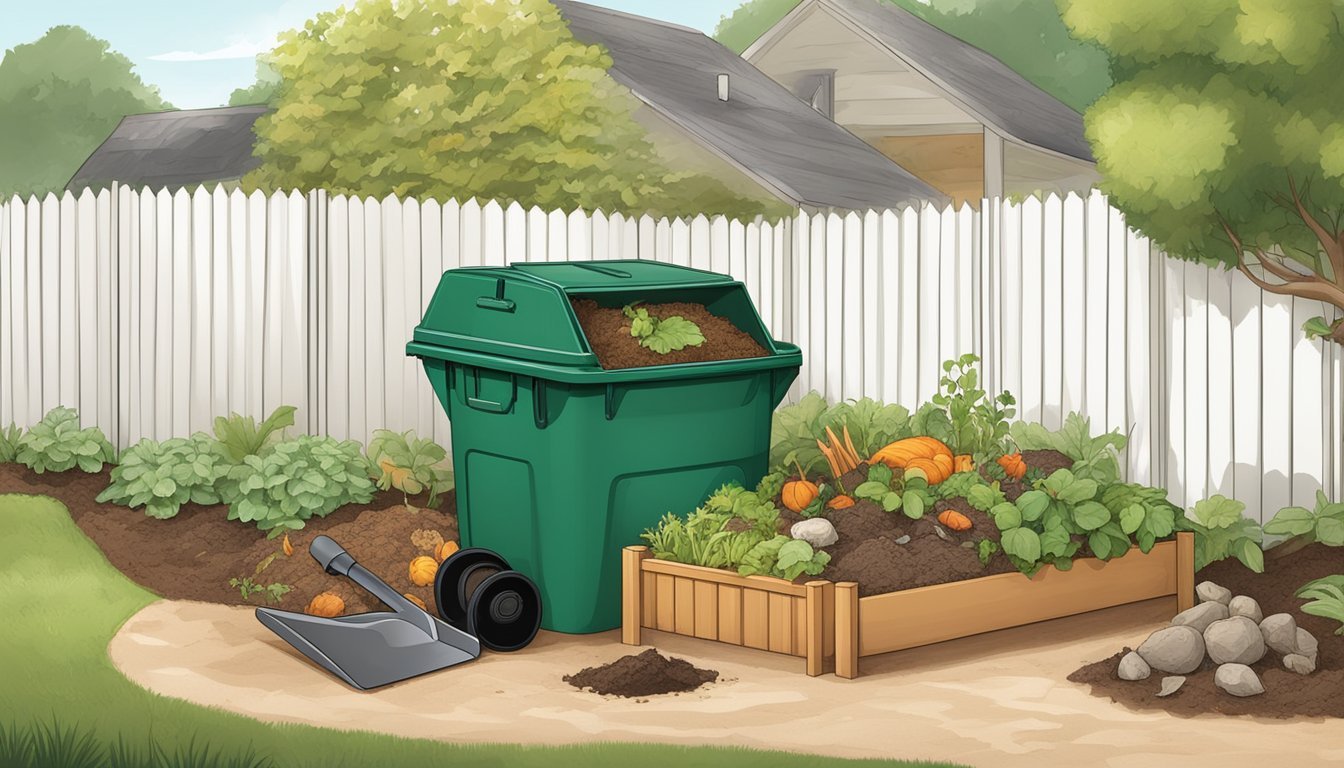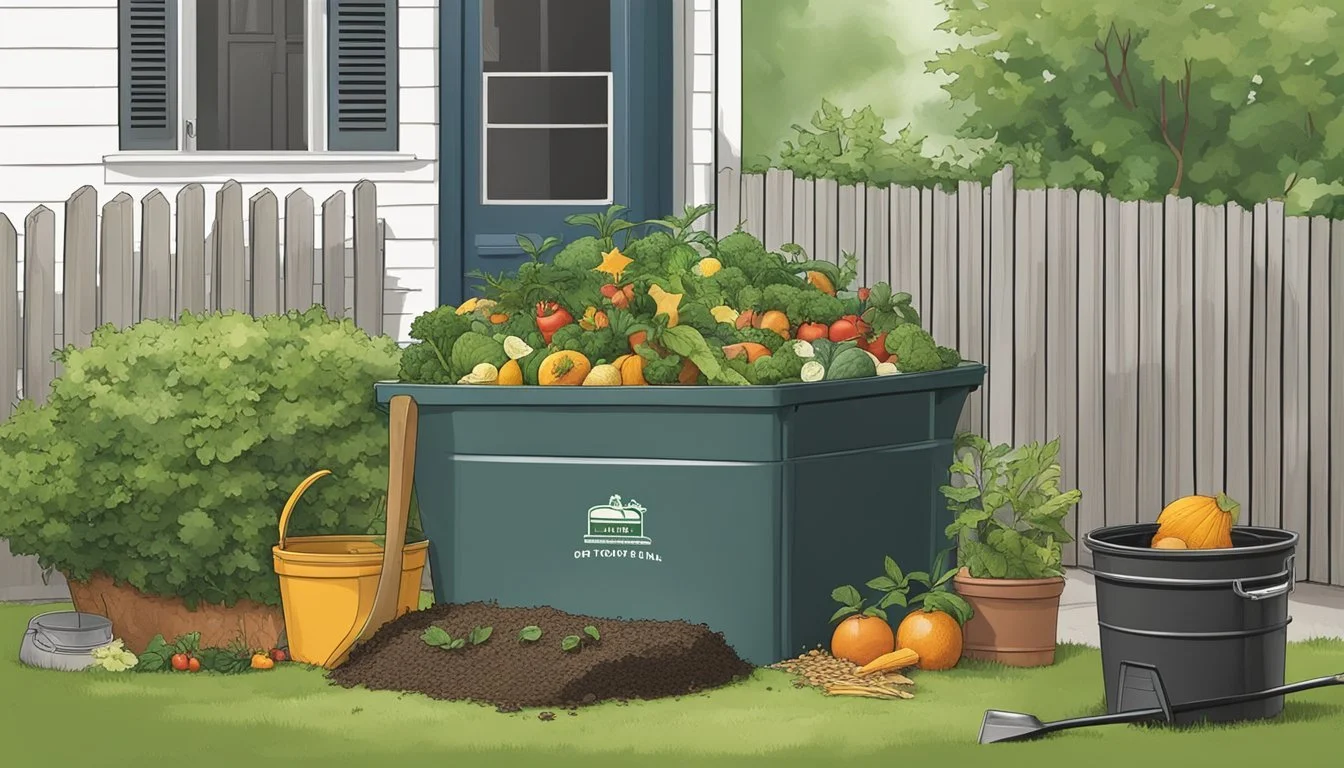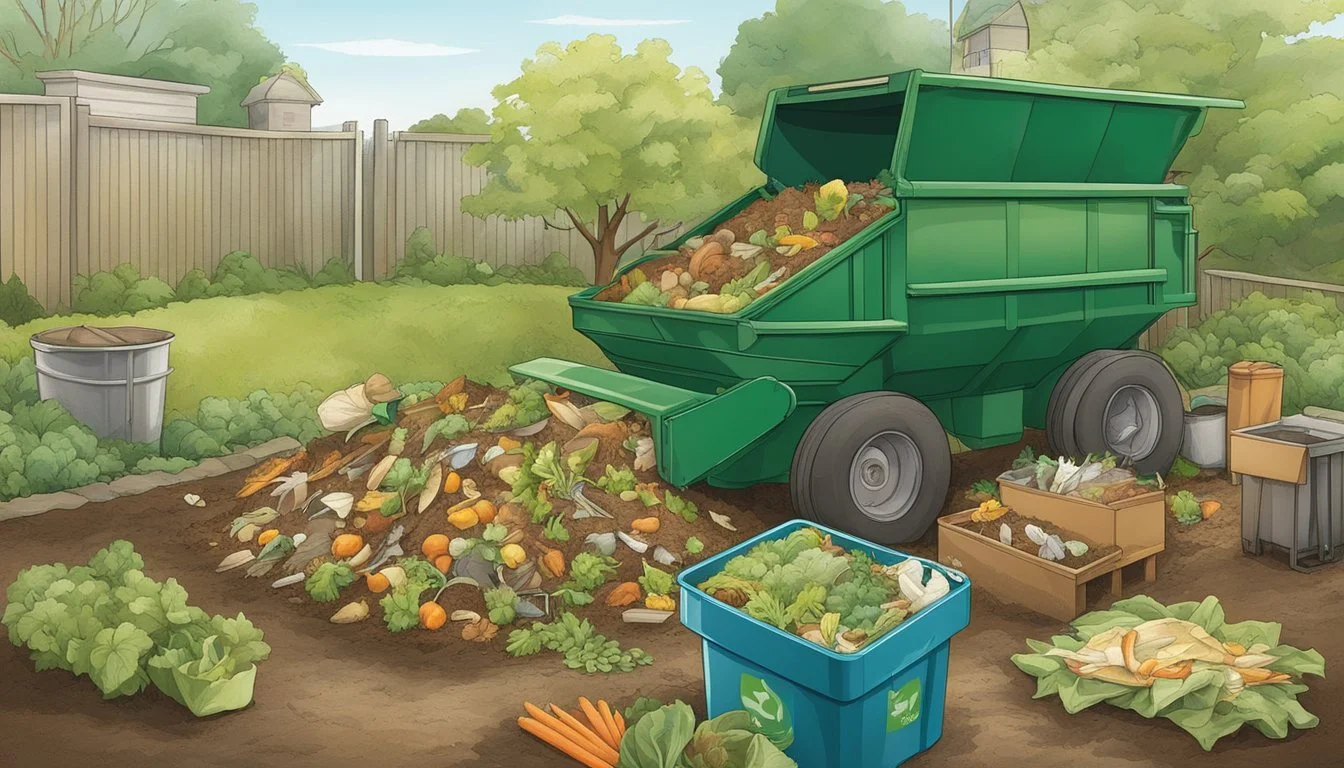Guide to Composting in Athens, GA
Essential Tips for Local Residents
Composting in Athens, Georgia, reflects a community passionately committed to sustainability and waste reduction. As a process that naturally recycles organic material into nutrient-rich soil, composting is an integral part of Athens' waste management strategy. This city has established several initiatives, including compost bins available for purchase, as well as educational programs like the Athens-Clarke County Master Composter Program, to help residents turn their kitchen scraps and yard waste into valuable compost. These actions have been instrumental in promoting an environmentally responsible lifestyle among Athenians.
Local government efforts, supported by organizations such as Keep Athens-Clarke County Beautiful, have made composting more accessible to everyone. Whether individuals want to manage their own compost pile or participate in curbside pickup services like Awesome Possum Composting, Athens provides a variety of options to contribute to a greener community. The city ensures that residents understand what can be composted through resources and guidance, like their What to Compost page, which explains what materials are suitable for both backyard and commercial composting facilities.
This guide aims to equip residents with the knowledge they require to effectively contribute to Athens’ composting efforts. Understanding the basics of composting, the benefits it brings to the soil and environment, and the local services and programs available enables the community to minimize waste and enrich their gardens. Engaging in composting practices is not only an investment in garden health but also a commitment to preserving Athens' natural beauty for future generations.
Composting Essentials
Composting in Athens, Georgia, is a straightforward practice that can significantly impact environmental sustainability and soil health. Understanding the fundamentals of composting and its benefits can help residents contribute positively to their community and reduce their carbon footprint.
What is Composting?
Composting is the natural process through which organic materials decompose into a nutrient-rich soil amendment, commonly known as compost. It involves the transformation of kitchen scraps, yard waste, and other biodegradable materials into humus, a component that enriches soil and nurtures plant growth.
In Athens, residents have access to a Commercial Composting Facility, which can handle a variety of items not suited for backyard composting due to the facility's capacity for rapid decomposition and higher temperature processing.
Benefits of Composting
Composting offers numerous advantages for both the environment and the local community. It reduces the amount of waste sent to landfills, thus lessening methane emissions, a potent greenhouse gas. Incorporating compost into the soil improves its structure, moisture retention, and nutrient content, which benefits agricultural practices and landscaping in the Athens area.
Local efforts in composting also stimulate environmental education and community involvement, and they support the goal of a reduced carbon footprint by encouraging residents and businesses alike to consider their waste-management practices.
Getting Started with Composting
Composting in Athens, GA presents an opportunity for residents to transform food scraps and other compostables into valuable soil amendment. The process is straightforward, requiring some basic knowledge and a simple setup at home.
Home Composting Setup
For those embarking on home composting, the initial step is to select a suitable container or bucket to house the compost. In Athens, a variety of bins can be used, ranging from a simple open pile to a more sophisticated tumbler. For apartment dwellers or those with limited space, a five-gallon bucket can suffice.
Choosing a Bin:
Five-gallon bucket: Ideal for small spaces
Tumbler: Aids in faster decomposition
Enclosed bin: Reduces pests and odors
Next, location is key. A backyard composting area should be well-drained, have partial shading, and be convenient for adding materials and turning the compost pile.
Understanding the Composting Process
Composting harnesses decomposition, the natural process where organic material is broken down into humus. A balanced mix of 'browns' and 'greens' will facilitate efficient decomposition.
Composting Ingredients:
Greens (Nitrogen-rich):
Kitchen scraps, like fruit and vegetable peelings
Coffee grounds, tea bags
Browns (Carbon-rich):
Dry leaves, straw
Newspaper, cardboard
The process should be monitored to ensure the pile remains moist and receives adequate air circulation. Turning the pile periodically will introduce oxygen, which is crucial for the microbes that break down the material. The presence of earthworms and the transformation of food scraps into dark, crumbly, earthy-smelling material indicates successful composting.
Compostable Materials
The journey of waste from kitchen scraps to nutrient-rich soil begins by understanding what can and cannot be composted in Athens, GA. This distinction is crucial to maintain an efficient composting process and preserve the quality of the resulting compost.
What Can Be Composted?
Food: Most kitchen scraps, such as fruit and vegetable peelings, coffee grounds, and tea bags, are perfect for the compost bin.
Composting in Athens, GA allows for a wider range of materials due to the availability of a Commercial Composting Facility. This facility can process more challenging materials that do not break down easily in backyard composting setups, such as certain certified compostable food service products. As for garden waste, grass clippings, leaves, and plant trimmings decompose well and enrich the compost.
Dairy: Generally, composting dairy products is not recommended due to odor issues and attracting pests.
Meat and Bones: Similar to dairy, these items should be avoided in residential composting systems as they can create odor problems and attract rodents.
Hair and Nail Clippings: These can be composted, but it is important to mix them in well, as they take longer to decompose.
Including soil in a compost mixture can be beneficial as it introduces microorganisms that help break down organic materials.
Items to Avoid in Composting
Certain items should not be introduced into the composting system, as they could hinder the decomposition process or create less than desirable compost. These include:
Napkins and paper that are heavily soiled with oil or grease should not be composted because they can slow down the process and may contain non-compostable materials.
Recycling items like plastics should never be placed in compost as they do not break down and can contaminate the soil.
Materials destined for the landfill should be critically evaluated, especially if they contain red dyes or other chemicals that could be harmful to the composting ecosystem.
In summary, while food waste and garden trimmings are excellent for composting, residents of Athens, GA should avoid adding dairy, meat, and bones to their compost to prevent potential problems.
Composting Methods
Composting is an effective way to recycle organic waste into valuable soil amendments, and in Athens, GA, residents have several methods available.
Backyard Composting
Backyard composting allows individuals to manage their organic waste at home by layering greens, such as kitchen scraps and clippings, with browns, like dry leaves and twigs. This method relies on the natural breakdown of materials through microbial activity. Residents can learn more about creating their own compost setup from Athens-Clarke County's guidelines on backyard composting.
Vermicomposting
Vermicomposting uses worms, typically red wigglers, to process organic waste into vermicompost, a highly nutrient-rich soil conditioner. This type of composting can be done indoors or outdoors and is suited for smaller-scale waste management. It is especially beneficial because worms can break down waste much faster than the typical decomposition process.
Commercial Composting Facilities
For larger-scale composting, commercial composting facilities can handle significant amounts of organic waste, including materials that are not always suitable for backyard composting. Athens-Clarke County offers facilities that manage organic waste at a municipal level, providing an option for businesses and residents who are unable to compost at home.
Composting by Athens-Clarke County
Athens-Clarke County supports composting initiatives through resources like educational programs and the sale of compost bins. Municipal efforts not only help to reduce waste sent to landfills but also create compost that can be used to enhance soil in public areas and local gardens. More information on the programs and facilities supported by the county can be found on the Athens-Clarke County official website.
Using Composted Material
Composted material serves as a nutritious soil amendment that can significantly benefit plant health and soil quality. It introduces beneficial microorganisms and essential nutrients, enhancing the growth and vitality of various plant species.
In Your Garden
In the garden, compost can be used to enrich the soil, boosting plant health and improving yield. Gardeners may incorporate compost into their vegetable patches to increase fertility and water retention. Vegetables thrive in nutrient-rich soil, which often results in a more bountiful harvest. Similarly, flower beds benefit from compost by flourishing with vibrant and healthy blooms.
Vegetables: Mix compost into the topsoil before planting to provide a slow release of nutrients.
Flowers: Apply compost around the base of plants to enhance growth and flower production.
For Landscaping
For landscaping applications, compost acts as a sustainable foundation for maintaining healthy lawns and ornamental plants. It can be used as a top-dressing on lawns to promote a lush, green appearance and as a mulch alternative in garden beds to suppress weeds and maintain moisture levels.
Lawns: Spread a thin layer of compost over the grass to encourage a dense turf.
Garden Beds: Use compost to condition the soil and protect against the extremes of weather, aiding in water conservation and plant survival.
Community Sharing
Community composting initiatives in Athens encourage residents to participate in a shared effort to reduce waste and promote sustainable practices. These programs often provide compost to community members for use in local gardens and green spaces, fostering a sense of collective responsibility and environmental stewardship.
Community Gardens: Utilize shared compost to enrich community garden plots.
Public Landscaping: Apply compost to improve soil structure and plant resilience in public areas.
Reducing Waste Impact
Reducing waste impact in Athens, GA, hinges on efficiently diverting organic material from landfills and adhering to a structured composting and recycling schedule. This approach lessens the environmental footprint and promotes sustainable resource use.
Diverting Organic Waste from Landfields
In Athens-Clarke County, approximately one quarter of the material in modern landfills is organic waste that could be composted. By diverting food waste and other compostables, the community can significantly decrease the amount of waste sent to landfills. This effort not only conserves space within the landfill but also returns valuable nutrients to the soil, supporting a healthier ecosystem. To facilitate effective composting, residents can acquire Earth Machine Compost bins offered by Keep Athens-Clarke County Beautiful, promoting a more sustainable way of managing household waste.
Composting and Recycling Schedule
Following a regular composting and recycling schedule is crucial for maintaining the momentum of Athens-Clarke County’s waste reduction efforts. The local government provides clear guidelines and resources to help residents understand what materials can be composted or recycled, and how to sort them correctly. The Athens-Clarke County Solid Waste Department ensures that relevant information concerning pickup times and recycling procedures is disseminated effectively to maximize community participation in the recycling program. Adhering to this schedule is essential in reducing the volume of waste that ends up in landfills and in fostering a culture of environmental responsibility.
Educational Resources and Outreach
Athens, GA, residents have a wealth of resources at their disposal for learning about composting, ranging from local university-led workshops to a variety of online learning materials.
Local Workshops and Events
UGA Extension plays a pivotal role in providing composting education to the Athens community. They offer a hands-on Master Composter Program, involving a comprehensive nine-week training course that engages participants in all aspects of the composting process. This program is beneficial for families interested in starting their own compost systems and teachers who wish to bring practical environmental science into their classrooms.
In addition to the Master Composter Program, Keep Athens-Clarke County Beautiful organizes events and can schedule a presentation about composting for schools, neighborhood groups, or businesses, providing a valuable resource for local gardeners and educators to share composting practices and benefits within their communities.
Online Tutorials and Guides
For individuals seeking flexibility or remote learning options, the Athens-Clarke County Solid Waste Department offers a host of online resources on their official website, including informative videos and research-backed guides. These resources make it simple for anyone to understand the composting process and how to implement it at home. They also provide critical research outcomes that help in understanding the broader impacts of composting on waste reduction.
Additionally, the UGA Extension has various online impact stories that highlight the success of composting initiatives and the importance of community involvement. Teachers may find these stories especially useful as educational tools to inspire students and integrate composting practices into school gardens and science curricula.
Community Involvement
In Athens, GA, community involvement is pivotal to the success and expansion of composting efforts. The residents play a crucial role in supporting local initiatives to reduce waste and enhance the city's environmental impact.
Volunteering and Participating in Local Composting
Athens-Clarke County offers various avenues for residents to engage with composting activities. Those interested can volunteer for the Master Composter Program, where they learn advanced composting techniques and can later share their knowledge with others. The county also encourages setting up composting presentations for educational purposes, which can be scheduled through known contacts.
Programs available:
Master Composter Program
Educational presentations
How to get involved:
Apply online for the Master Composter Program
Schedule a presentation via call or email
Athens Composting Initiatives
The community's mission to reduce the carbon footprint includes various composting initiatives. A memorable collaboration is the Athens-Clarke County/UGA Composting Pilot which signifies a partnership between local government and educational institutions. This pilot project has set out to improve recycling of organic material and involves the residents through a curbside pick-up service, engaging up to 400 households to make a difference.
Local initiatives:
Curbside pick-up project
Residential Compost Pilot Project
Targets:
Engaging households
Improving organic waste recycling
Composting Services in Athens
Athens, Georgia, offers a variety of composting services catering to residential and commercial needs. These services aim to enhance the city's green initiatives by transforming organic waste into valuable compost.
Residential Composting Pick-up
Residents in Athens can enjoy the convenience of residential curbside compost pickup services. These services provide weekly pick-up of kitchen scraps directly from your doorstep. Offering an environmentally friendly alternative to waste disposal, these programs aim to promote recycling and reduce landfill contribution.
Schedule: Weekly pickup
Contact: Visit the service provider's website for email and customer service information.
Business Composting Solutions
For businesses, Athens offers commercial composting facilities that manage larger quantities of organic waste. These services support local businesses in practicing sustainability by recycling large-scale organic material, contributing to a greener Athens.
Recycling: Accepts a wide range of organic waste products
Contact: Information available on the Athens-Clarke County official website.
Contact and Support
To get started with composting services in Athens or for support, individuals and businesses can contact providers such as Let Us Compost. This organization offers resources and guidance to help Athens residents and business owners make the most of local composting services.
Customer Service: Detailed contact information available on providers' websites.
Email: For specific inquiries, email is often the best point of initial contact.
Composting Advocacy and the Future
Composting in Athens, GA, is increasingly seen as a key player in sustainability initiatives, with ongoing research targeting a reduction in the city's carbon footprint and greenhouse gas emissions from waste.
Promoting Sustainability in the Greater Community
Encouraging the community to adopt composting practices can have a significant impact on environmental health. Athens-Clarke County has embraced this by offering educational resources on the benefits of composting to enrich soil and regenerate less fertile landscapes. Outreach programs are not just limited to local actions; they extend into the broader scope of promoting sustainability in Atlanta and beyond. Such initiatives receive support from the Environmental Protection Division, ensuring that composting advocacy aligns with wider environmental goals.
Future Developments in Composting Technology
Research institutes, including The University of Georgia, have been at the forefront of innovative composting technology. Studies focus on improving composting efficiencies and expanding the range of compostable materials. In the near future, these technological advancements could drastically decrease the carbon footprint of local communities and mitigate the generation of greenhouse gases associated with traditional landfill waste disposal. The expected outcomes of these developments are watched by both environmentalists and policymakers with great interest.







